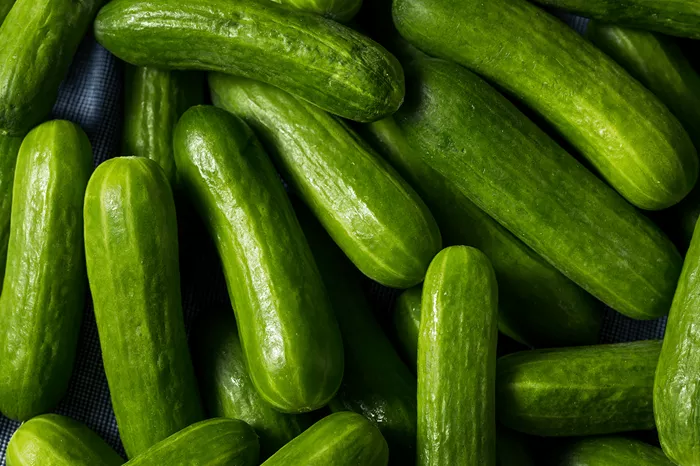Cucumber, a versatile and widely consumed vegetable, plays a significant role in promoting health and wellness. Known for its high water content and refreshing taste, cucumbers are rich in essential nutrients, antioxidants, and fiber. This article explores the various benefits of cucumber consumption, detailing how it supports hydration, weight management, skin health, and more.
Nutritional Profile of Cucumber
Vitamins and Minerals
Cucumbers are low in calories but high in valuable nutrients. A typical cucumber contains:
Vitamin K: Important for blood clotting and bone health.
Vitamin C: An antioxidant that supports the immune system and skin health.
Potassium: Helps regulate fluid balance, nerve signals, and muscle contractions.
Magnesium: Involved in over 300 enzymatic reactions in the body.
Manganese: Supports bone health and metabolic functions.
Hydration
Cucumbers are composed of about 95% water, making them an excellent source of hydration. Proper hydration is crucial for maintaining bodily functions, including digestion, nutrient absorption, and temperature regulation.
Low-Calorie Content
With only about 16 calories per cup, cucumbers are an ideal food for those looking to manage their weight without compromising on nutrition.
Health Benefits of Cucumber
1. Hydration and Detoxification
Supports Hydration
Cucumbers are one of the best natural ways to stay hydrated, especially in hot climates or during physical activity. Adequate hydration supports various bodily functions, including kidney function, digestion, and skin health.
Aids in Detoxification
The high water content in cucumbers helps flush out toxins from the body, supporting liver and kidney function. They also contain compounds like cucurbitacin, which have anti-inflammatory properties and aid in detoxification.
2. Weight Management
Low-Calorie, High-Nutrient Food
Cucumbers are low in calories but high in essential nutrients, making them an excellent addition to any weight loss or weight management plan. They provide bulk to the diet without adding significant calories, which can help control hunger and reduce overall calorie intake.
Promotes Satiety
The high water and fiber content in cucumbers contribute to a feeling of fullness, which can prevent overeating and help manage weight.
3. Skin Health
Hydration for Skin
Proper hydration is essential for maintaining healthy skin. Cucumbers’ high water content helps keep the skin hydrated and glowing.
Antioxidant Properties
Cucumbers contain antioxidants like vitamin C and beta-carotene, which protect the skin from oxidative stress and damage caused by free radicals. These antioxidants also help reduce inflammation and support skin repair.
Topical Benefits
Cucumbers can be used topically to soothe skin irritations and reduce swelling. The cooling effect of cucumber slices on the skin can help reduce puffiness, especially around the eyes, and alleviate sunburn.
4. Digestive Health
Rich in Fiber
Cucumbers are a good source of dietary fiber, particularly in the skin. Fiber is essential for maintaining a healthy digestive system. It adds bulk to stool, which helps prevent constipation and promotes regular bowel movements.
Promotes Gut Health
The water and fiber content in cucumbers help maintain a healthy gut environment. A healthy gut microbiome is essential for overall health, impacting everything from digestion to immune function.
5. Cardiovascular Health
Regulates Blood Pressure
Cucumbers are rich in potassium, a mineral that helps regulate blood pressure by balancing the effects of sodium. Maintaining healthy blood pressure levels is crucial for reducing the risk of cardiovascular diseases.
Supports Heart Health
The antioxidants and anti-inflammatory properties of cucumbers contribute to overall heart health. Regular consumption can help reduce the risk of heart disease by improving cholesterol levels and reducing inflammation.
6. Antioxidant and Anti-inflammatory Properties
Rich in Antioxidants
Cucumbers contain several antioxidants, including flavonoids and tannins, which help prevent the accumulation of harmful free radicals and reduce the risk of chronic diseases.
Anti-inflammatory Effects
The anti-inflammatory properties of cucumbers help reduce inflammation in the body. Chronic inflammation is linked to numerous health issues, including heart disease, diabetes, and autoimmune conditions.
7. Bone Health
Source of Vitamin K
Cucumbers are a good source of vitamin K, which is essential for bone health. Vitamin K helps improve calcium absorption and bone mineralization, reducing the risk of osteoporosis and fractures.
8. Supports Eye Health
Contains Beta-Carotene
Cucumbers contain beta-carotene, a precursor to vitamin A, which is essential for maintaining healthy vision. Adequate intake of beta-carotene can help reduce the risk of age-related macular degeneration and other eye conditions.
Culinary Uses of Cucumber
Versatility in Recipes
Cucumbers can be enjoyed in a variety of ways, adding a refreshing crunch to numerous dishes. Some popular uses include:
Salads: Adding cucumbers to salads provides a refreshing and hydrating element.
Smoothies: Blending cucumbers into smoothies boosts hydration and adds a mild, refreshing flavor.
Pickles: Pickling cucumbers enhances their flavor and extends their shelf life.
Infused Water: Adding cucumber slices to water creates a flavorful and hydrating beverage.
Healthy Snacks
Cucumbers make a healthy and convenient snack. They can be sliced and paired with hummus or yogurt for a nutritious and satisfying treat.
Culinary Diversity
Cucumbers can be used in various cuisines, from Mediterranean dishes like tzatziki to Asian-inspired cucumber salads, showcasing their versatility and adaptability in different culinary traditions.
How to Incorporate More Cucumber into Your Diet
Add to Salads
Incorporate cucumbers into salads for added hydration and crunch. Pair them with a variety of vegetables, greens, and a light vinaigrette for a healthy meal.
Cucumber Smoothies
Blend cucumbers into your smoothies to increase hydration and nutrient intake. Combine with fruits like pineapple, spinach, and a splash of lemon for a refreshing drink.
Cucumber Snacks
Slice cucumbers and pair them with your favorite dips, such as hummus, guacamole, or tzatziki, for a quick and healthy snack.
Infused Water
Add cucumber slices to your water along with mint and lemon for a refreshing and hydrating beverage.
Cucumber Pickles
Pickle cucumbers with vinegar, dill, garlic, and spices to create a tangy, crunchy addition to sandwiches and salads.
Growing Your Own Cucumbers
Easy to Grow
Cucumbers are relatively easy to grow in home gardens, making them accessible for many people. They can be grown in pots or garden beds, requiring only sunlight, water, and proper soil.
Health Benefits of Homegrown Cucumbers
Growing your own cucumbers ensures they are fresh and free from pesticides, providing the highest nutritional value. Home gardening also promotes physical activity and can be a rewarding hobby.
Conclusion
Cucumbers are a highly beneficial addition to the diet, offering a range of health benefits from hydration and detoxification to improved skin and digestive health. Their rich nutritional profile, low-calorie content, and versatility make them an ideal food for those looking to enhance their overall health. Incorporating cucumbers into your daily diet can lead to significant improvements in hydration, weight management, cardiovascular health, and more. Whether enjoyed in salads, smoothies, or as a refreshing snack, cucumbers are a simple yet powerful tool for promoting health and well-being.
[inline_related_posts title=”You Might Be Interested In” title_align=”left” style=”list” number=”6″ align=”none” ids=”9301,9297,9262″ by=”categories” orderby=”rand” order=”DESC” hide_thumb=”no” thumb_right=”no” views=”no” date=”yes” grid_columns=”2″ post_type=”” tax=””]
































